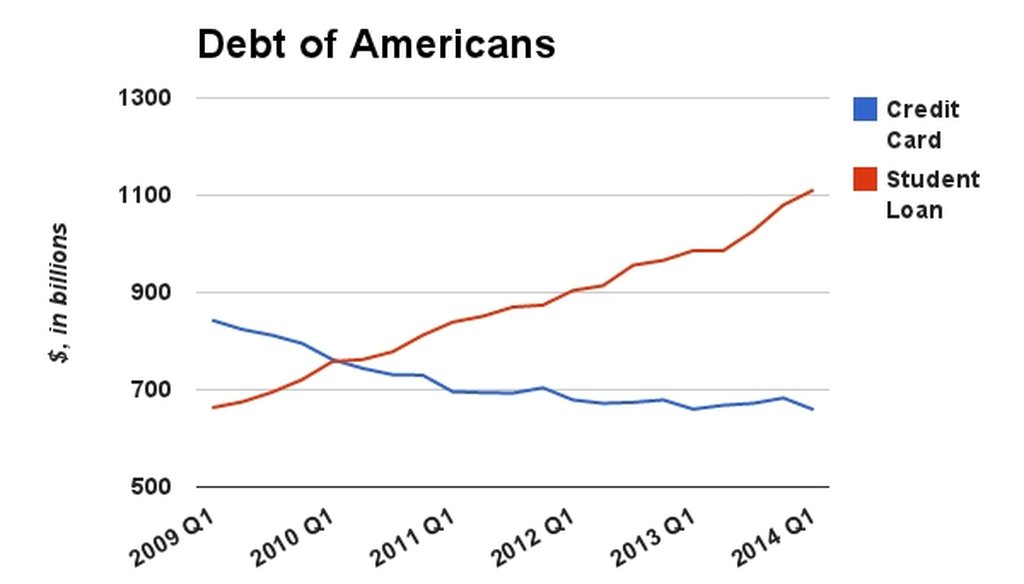



Data from the Federal Reserve Bank of New York shows that student loan debt eclipsed credit card debt among the American public in the second quarter of 2010.
Sen. Mark Warner’s re-election stump speech dwells on giving everyone an equal opportunity and high on that list is an affordable college education.
Warner and many of his fellow Democrats have called for legislation that would ease student debt by allowing students to refinance their federal college loans at substantially lower interest rates and limit their loan repayments to 10 percent of their annual income. President Barack Obama endorsed those measures during a speech Monday..
Warner, during a recent speech of his own, said, "Right now, America has $1.1 trillion of student debt. That’s more than credit card debt."
This statistic caught our attention, so we put it to the Truth-O-Meter.
David Turner, spokesman for Warner’s campaign, backed up the statement by sending us a speech by an official at the Consumer Financial Protection Bureau and data from the Federal Reserve System.
Both of those sources say that student debt has topped $1 trillion and the speech noted that it had surpassed credit cards. But the best data comes from the Federal Reserve Bank of New York, which publishes debt statistics every quarter.
In the most recent report, covering first three months of 2014, student loan debt totaled $1.1 trillion, while credit card debt hit $659 billion. The largest type of debt for Americans is mortgages, which came in at $8.2 trillion in the first quarter. Student loan debt is No. 2, followed by automobile loans at $875 billion and credit card debt in making up $11.7 trillion in all debt.
Student debt began to outpace credit card debt in the second quarter of 2010, when college loans hit $762 billion. Student debt topped the $1 trillion mark in the third quarter of last year.
Average tuition across the nation increased 79.5 percent from 2003-2013, according to data from the U.S. Labor Department. For comparison, the Consumer Price Index grew by 26.7 percent during the same span and average wages grew by 30.1 percent.
Credit card debt, by contrast, has gradually fallen from $843 billion in early 2009 to its $659 billion level this year. Much of the decrease occurred during the recession when people cut back on spending.
But the recession exacerbated college debts, according to Caroline Ratcliffe, a senior fellow at the Urban Institute. She cited two reasons:
"You have to remember that during the time of the Great Recession, more people were going back to school because of the job situation, so they were taking on more debt," she said.
A study she co-wrote tackled the demographics of people with student loan debt. It found that student loan debt, for those ages 29 to 37, had increased by $10,381 on average from 1989 to 2010, while car loans had increased $302, credit card debt had increased $1,215 and other debt had decreased $2,078.
In 2012, 40 percent of Americans in their 20s had student debt, 30 percent in their 30s owed on student loans, 19 percent of Americans in their 40s, 12 percent in their 50s and 4 percent in their 60s. This included students and parents who borrowed to send their children to college.
Our ruling
Warner said, "Right now, America has $1.1 trillion of student debt. That’s more than credit card debt."
His figure on student debt is accurate and total U.S. credit card debt in the first quarter of this year was $659 billion. We rate Warner’s statement True.
Mark Warner, "Mark Warner on Why He Wants This Job Again," on YouTube, May 29, 2014.
Emails from David Turner, Warner’s campaign spokesman, June 2, 2014.
Consumer Financial Protection Bureau, "Student Debt Swells, Federal Loans Now Top a Trillion," July 17, 2013.
Board of Governors of the Federal Reserve System, "Consumer Credit - G. 19," March 2014.
Federal Reserve Bank of New York, The Center for Microeconomic Data, 2014 Q1 Data, accessed June 4, 2014.
Interview with Caroline Ratcliffe, senior fellow at the Urban Institute, June 4, 2014.
Urban Institute, "Forever in our Debt: Who Has Student Loan Debt, and Who’s Worried?" June 2013.
Urban Institute, "Lost Generations? Younger Generations Are No Longer Richer than Their Predecessors," March 2013.
Richmond Times-Dispatch, Business Briefs for March 8, March 8, 2011.
U.S. News & World Report, "Charts: Just how fast has college tuition grown?" Oct. 23, 2013.
Social Security Administration, National Average Wage Index, assessed Jun 9, 2014.
In a world of wild talk and fake news, help us stand up for the facts.
